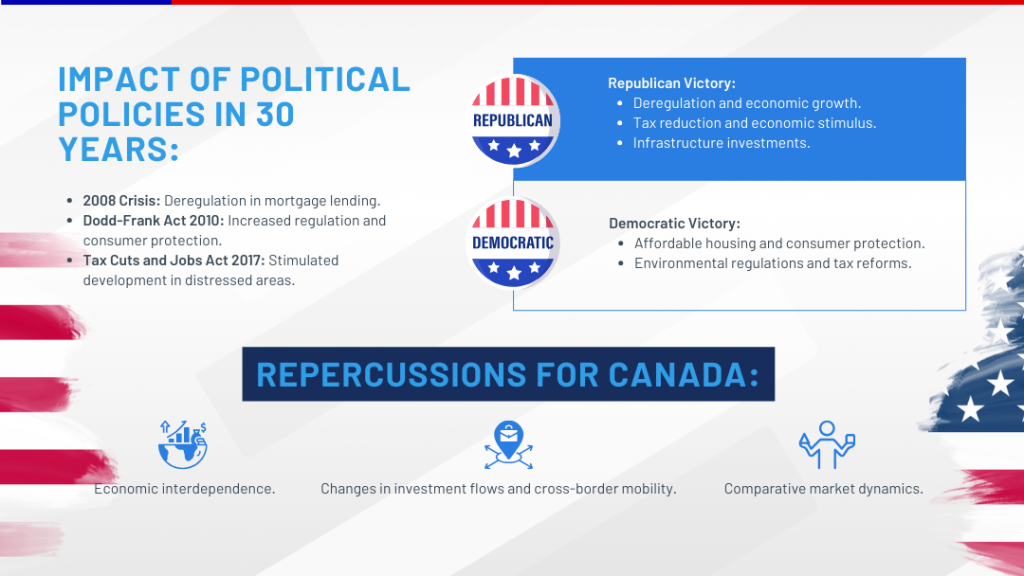
Real estate: How the US presidential election could influence the market.
With three decades of experience in the U.S. real estate market, I’ve witnessed firsthand how presidential policies influence our industry. The ever-shifting political landscape continually reshapes housing regulations, investment climates, and market dynamics. In this article, I’ll delve into how presidential elections impact real estate, drawing from historical examples and providing a comparative analysis of potential Republican and Democratic victories.
Republican Victory: Deregulation and Economic Growth
When Republicans win the presidential election, the real estate market often trends towards deregulation and policies that favor economic growth. Historically, Republican administrations have implemented measures that include:
- Deregulation:
- Reducing regulatory burdens on developers, thereby facilitating more construction projects.
- Simplifying zoning laws and building codes, which can increase housing supply and lower costs for developers.
- Example: The Tax Cuts and Jobs Act of 2017 under President Trump included provisions for Opportunity Zones, spurring development in economically distressed areas.
- Tax Policies:
- Lowering corporate taxes, which can boost profitability for real estate investors and developers.
- Maintaining or enhancing mortgage interest deductions, encouraging homeownership.
- Example: The 2003 Jobs and Growth Tax Relief Reconciliation Act under President Bush, which included tax cuts that benefited real estate investors.
- Economic Stimulus:
- Implementing policies aimed at stimulating economic growth, potentially leading to higher employment and income levels, thereby increasing housing demand.
- Example: The economic stimulus measures following the 2008 financial crisis, including infrastructure investments and tax incentives for homebuyers.
- Infrastructure Spending:
- Investing in significant infrastructure projects, which can boost property values in areas affected by these improvements.
- Example: The 2005 Transportation Equity Act, which allocated funds for highway and transit projects, indirectly benefiting nearby real estate markets.
However, these policies can also lead to increased property prices and rental rates due to higher demand and faster economic growth. While this can benefit property owners and investors, it may pose challenges for first-time buyers and low-income renters.
Democratic Victory: Affordable Housing and Consumer Protection in real estate
A Democratic victory typically steers the real estate market towards more regulation, with a focus on affordable housing and consumer protection. Key areas of impact include:
- Affordable Housing Initiatives:
- Increasing funding and incentives for affordable housing projects.
- Implementing rent control measures to protect tenants from steep rent increases.
- Example: The Affordable Housing Credit Improvement Act of 2019, which aimed to expand affordable housing availability.
- Consumer Protection:
- Enforcing stricter regulations to ensure fair practices in mortgage lending and real estate transactions.
- Enhancing support for first-time homebuyers, potentially through tax credits or down payment assistance programs.
- Example: The Dodd-Frank Wall Street Reform and Consumer Protection Act of 2010, which introduced significant regulations to protect consumers in the housing market.
- Environmental Regulations:
- Emphasizing sustainable development and green building standards, which could increase construction costs but promote long-term environmental benefits.
- Example: The Green New Deal proposal, which includes measures to encourage energy-efficient building practices.
- Tax Reforms:
- Potentially increasing capital gains taxes and changing property tax deductions, affecting the profitability of real estate investments.
- Example: Proposals to increase taxes on high-income earners to fund social programs, which could impact real estate investors.
While these policies aim to make housing more accessible and fair, they might slow down the pace of new developments due to increased regulatory requirements and higher costs for developers.
Repercussions for the Canadian Real Estate Market
The outcome of U.S. presidential elections also has significant implications for the Canadian real estate market, due to the interconnected nature of the North American economy:
- Economic Interdependence:
- U.S. economic policies influence Canadian trade, employment, and economic growth, indirectly affecting Canadian housing demand and prices.
- Investment Flows:
- Changes in U.S. real estate policies can redirect investment flows. For example, stricter U.S. regulations might push more investors towards the Canadian market, driving up property prices.
- Cross-Border Mobility:
- Policies affecting immigration and cross-border travel can influence the demand for housing in Canadian cities popular with American expatriates or investors.
- Comparative Market Dynamics:
- A Republican-led U.S. might see a more competitive real estate market due to deregulation, potentially making Canadian real estate a more stable and attractive investment alternative.
- Conversely, a Democrat-led U.S. with enhanced housing protections could inspire similar policy shifts in Canada, promoting affordable housing but potentially increasing regulatory burdens on developers.

The U.S. presidential election results will undoubtedly shape the future of the real estate market. A Republican victory is likely to favor deregulation and economic growth, potentially boosting the market but also increasing property prices.
A Democratic victory would emphasize affordable housing and consumer protection, possibly leading to more accessible housing but slower development rates. Both scenarios will have ripple effects on the Canadian real estate market, highlighting the importance of strategic planning for realtors, investors, and developers on both sides of the border.
For more insights and up-to-date information on how political shifts impact real estate, check out these related articles:
- How U.S. Economic Policies Influence Canadian Real Estate
- Navigating Real Estate Investments During Political Transitions
- Understanding the Impact of Regulatory Changes on Real Estate
If you’d like to discuss how these potential changes could affect your real estate investments or explore our services, feel free to contact us. Our platform is designed to help you grow your business and navigate the complexities of the real estate market effectively.

